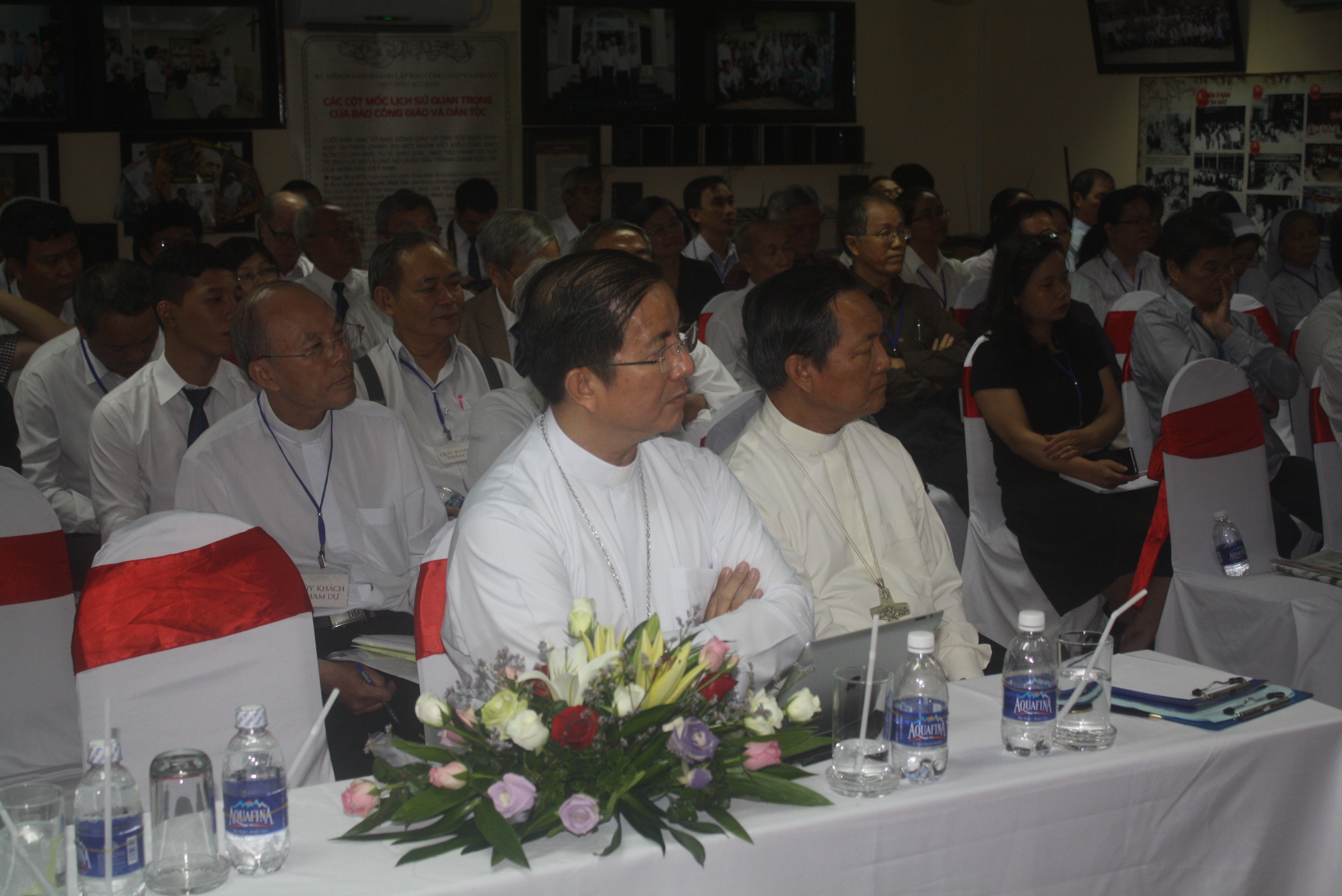
Seventy clergy, religious, laypeople and representatives of other faiths attended the gathering on June 26. (Joachim Pham)
Prominent Vietnamese Catholics gathered here June 26 to mark an important pastoral turning point in Vietnamese church history. Some 70 Catholic clergy, religious, lay leaders and religious researchers came together to commemorate a May 1980 pastoral letter issued by the bishops that has guided Vietnamese Catholicism for 35 years.
Vietnam was divided into two nations in 1954 after Northern Communist forces defeated French troops. The document was issued five years after the reunification of the country at the end of the Vietnam War in 1975 and came out of the first joint meeting of Northern and Southern bishops.
It was an “important, vital, useful, timely landmark in the history of the Catholic Church in Vietnam,” wrote Bishop John Baptist Bui Tuan of the Long Xuyen diocese, located in the Mekong Delta, in a letter he sent to the gathering. Tuan is one of only two living Vietnamese bishops who attended the landmark 1980 meeting.
Tuan was ordained a bishop on April 30, 1975, the day Northern Communist forces entered Saigon, then the capital of South Vietnam. The 87-year old bishop recalled in his letter that the pastoral document — which emerged out of nearly a week of discussions by the bishops and was issued May 1, 1980 — brought him great “peace of mind.” He wrote that the letter allowed Catholics to “embark on a more open lifestyle,” one less antagonistic to the Communists who had taken control of the country.
Thanks to that letter, said Tuan, Catholics have made “creative and brave commitments to serving our compatriots, but have still kept in close touch with the Holy See and have been in communion with one another.”
The meeting was organized by the Institute for Religious Studies and the government-approved Catholic weekly, Cong Giao va Dan Toc. Archbishop Paul Bui Van Doc of the Ho Chi Minh City archdiocese celebrated the opening Mass of the gathering with a total of 10 scientific reports and presentations.
Until 1980, the Vietnamese bishops had largely been avowed enemies of Communism. The pastoral letter, based on thinking that had come out of the Second Vatican Council, for the first time officially established some common ground between the two old time antagonists of church and state.
The pastoral letter called upon Vietnamese Catholics to help build the country by “living the Gospel amidst the nation in order to serve the happiness of our compatriots.”
The North Vietnamese government forbid Vietnamese bishops from leaving the country to attend Vatican II. Meanwhile, South Vietnamese authorities allowed bishops living there to attend.
The most prominent Vietnamese cleric to attend was Archbishop Paul Nguyen Van Binh, who headed the Saigon archdiocese from 1960 to 1995, dying at the age of 84.
Binh was strongly influenced by Vatican II and began to implement Council reforms in his archdiocese and throughout South Vietnam. He became an advocate of a Vietnamese pastoral form of Catholicism that respected the voice of the laity and sought ways for Catholic clergy, religious and laity to work to assist the needy.
In 1975, when the Communists took control of the South and the last Americans left Vietnamese soil, the newly formed unity government shut down Catholic enterprises, closing Catholic hospitals and schools and heavily restricting religious activities.
It took five years before Communist authorities would allow the Catholic bishops of North and South Vietnam to meet and discuss church matters. They met from April 24 to May 1, 1980, in Hanoi.
Nguyen Dinh Dau, 95, the oldest living Catholic intellectual in Vietnam, noted in a statement that it was Binh who wrote the draft of the document that was eventually published by the Vietnamese bishops.
Dr. Nguyen Quoc Tuan, rector of the government’s Institute for Religious Studies, said the letter told Catholics they “must journey with the nation and share the community life with the nation." He said various surveys made by his institute showed “Catholics have quietly made great contributions to the society for decades.”
It was not only peace with government officials the 1980 pastoral letter was calling for; it also called upon Catholics for the first time to unambiguously embrace their local culture and rites.
Dr. Nguyen Hong Duong, also from the institute, said the letter was a great achievement on behalf of local church enculturation. The letter, he noted, called upon Catholics to “develop a lifestyle and expression of faith that are in compliance with national tradition.” This meant, he explained, that Catholics throughout the country could feel free for the first time to perform ancestral worship rites.
Duong concluded that the pastoral letter brought a “wonderful freshness and vitality to local Catholics’ enculturation process.”
[Joachim Pham is an NCR correspondent based in Vietnam.]



